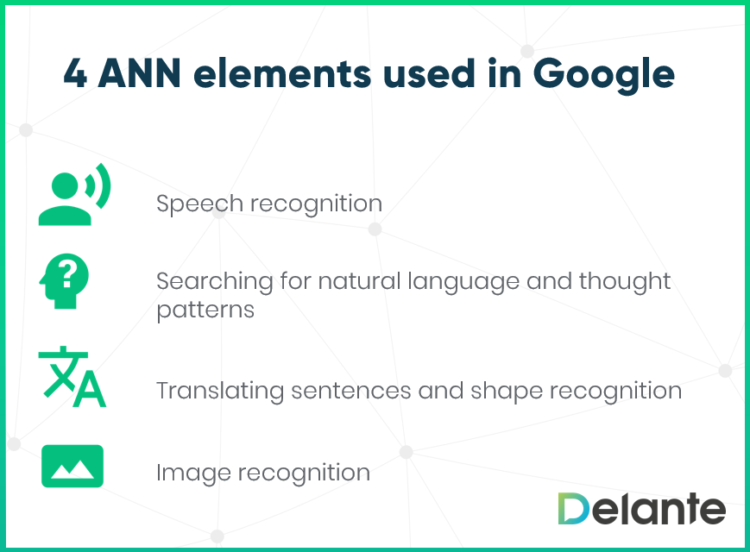Artificial Intelligence in SEO. How is Google using AI?

It’s a well-known fact that artificial intelligence is now commonly used in various fields. It’s no different when it comes to SEO and SEM. Interested in learning more about an AI search basis? Want to know why you should add it to your areas of interest? You’re in the right place.
First, let’s start with some crucial definitions.
What is AI?
AI – artificial intelligence is a field of knowledge that engages in building software and systems that directly reflect human behavior and thought processes.
Artificial intelligence combines knowledge from different industries such as engineering, IT, medicine, psychology or statistics.
Machine Learning – How Can It Support Your SEO Process?
One of the things you should know from the start is that artificial intelligence is based on machine learning.
Its main function is to evolve a self-reliant system that works based on gathered data and automatic learning. Simply speaking, the system is gathering information, analyzes it and develops its own processes. As new information flows in, it extends its “neural network” and sensitizes the system to new incentives or factors.
How to Handle All That Data – Big Data Workflow
Big data means working with an extremely broad database. Handling such information networks is especially important when it comes to industries in which fresh data influences the whole field development. In this case, regular information updates allow implementing innovations and other improvements.
At this point, given that these are good examples of such industries, it’s good to take a closer look at
- medicine and
- media.
Using big data in the medical industry is a common practice in India. Local physicians, in cooperation with the United States medics, provide a comprehensive service of medical results analysis and, thanks to algorithms’ support, can effectively detect disease schema.
Media, on the other hand, test the ability to create content based on AI developed systems – via gathering and analyzing data and preparing high-quality content.
What is more, machine learning proves to be useful also in mechanics, robotics and educational fields.
Google and The Attempt to Implement an AI Search
A couple of years ago Alphabet Co., a part of which is a Google tycoon, informed about introducing a massive change regarding the SEO process. This influenced the wide use of artificial intelligence in SEO that, according to surveys, dates back to 2016.
What’s interesting is that a few years earlier, Google was actively looking for young and ambitious MIT engineers, who would take upon a challenge and develop the first AI implementation plans.
From 2012 Google, officially, implements the AI search. As a result, Google crawlers are no longer supporting the black hat SEO practices.
ANN – AI in SEO
The activity of the ANN (Artificial Neural Network) is similar to the activity of our brain: each subsequent tissue stimulates another one. Extensive scripts are learning and then predict possible solutions; in case of failures, they learn from mistakes. The more particular variables Google gathers, the better the search results it has.
Machine learning is all about so-called layers. For Google, ML operations are based on 4 fundamental elements:
- Speech Recognition
Where the system looks for nouns, verbs, and words that can suggest users’ queries. According to Vincent Vanhoucke, Google Brain AI technology expert, the neuronal network for deep learning decreased the percent of invalid search results by 25%. - Searching for natural language and thought patterns
Associating initial queries with results, e.g.: What herbs to use for hair growth associated with: Field Horsetail. - Translating sentences and shape recognition
ANN associates sentence shapes – similar length and construction, regardless of the language, allows for more precise search results. - Image recognition
A common result for queries is an image. In this case, image description is crucial to enable search engines to understand its content.
Google Algorithms and Artificial Intelligence
The impeccable network of search engine algorithms is based on AI foundations. The fundamental ones being:
- Crawling and indexing
Googlebot is working with our on-site operations – it checks how the link structure is spreading using, for instance, robots.txt files. - Updates
Updates’ purpose is to increase search results utility. The big data analysis shows the most optimal operation path. - Ranking factors
Up until now, approximately 200 ranking factors have been developed. Each of them has its own, internal criteria. It’s nothing else but the results of AI studies that stand behind most of those currently used ranking factors.
What Are the Perks of AI in SEO?
- It helps to build a strategy
Implementing a comprehensive, AI-based strategy assures a significant performance increase. Thanks to artificial intelligence in SEO processes our operations become much more precise as the human factor is eliminated. With its well-developed structure, AI tools can efficiently detect not only technical issues but also structural and content-related ones. - It speeds up the whole process
Artificial intelligence in SEO considerably minimizes the amount of time we would otherwise need for wearisome content analysis. AI-based internal processes allow creating a knowledge core, ready to use for planning further operations. - It contributes to maintaining a close relationship with customers
AI search is all about obtaining detailed and precise information about the customer performing a specific query. Thanks to such complex knowledge we can specify customers’ demographics and conduct better, personalized communication.
RankBrain – AI for Google
For webmasters, one the best-known tool that contains artificial intelligence in SEO solutions is RankBrain – the Google algorithm component. Its accuracy is a result of continual data acquiring – with every query entered to the Google search engine, RankBrain becomes richer with brand new, detailed information.
Undoubtedly, such a solution might be a contradiction to well-known SEO practices and, as a result, it may raise the ranking position of weaker domains (parameter wise) which, on the other hand, can provide the user with better answers for entered queries. However, it doesn’t necessarily have to negate current webmasters’ SEO knowledge.
Thanks to RankBrain, search engine bots acquire the most essential knowledge and provide more precise answers for the queries.
Different motions within SERPs may also be the result of algorithm changes (like the biggest recent update named Bert). At this point, it’s worth mentioning that RankBrain’s efficiency is also an implication of AI independent activities. During one of the Q&A sessions, Google researchers pointed out that this component’s performance is, little by little, out of control – the artificial intelligence starts to act automatically and often doesn’t go by its creators’ suggestions.
What’s important for RankBrain when evaluating your content?
Experts from Moz recently came up with interesting conclusions. They determined parameters that are most likely to get Artificial intelligence to your side. Those include i.a.:
- Clicks
The number, frequency, and regularity of our website views. - The session’s quality
For how long the user was engaged with your website content, as well as which parts were the best answer for the user’s query and the time spent on engaging with your content. - Users’ interest
Whether the user explored just one of your pages or maybe followed the link structure to reach other subpages. - Pogo sticking
Choosing the first result on the search results page, evaluating its contents and moving on to the next result.
While gathering mentioned base information, artificial intelligence can, in a flash, estimate the potential of the page, its substantive level and determine the value it brings to a potential user.
Machine Learning in SEO
Ok, but how machine learning, the core of artificial intelligence, is influencing SEO?
- Sensitizing search engine bots to “natural language”
Implementing recent changes in Google algorithms allows putting those pages that provide simple and thorough answers to users’ queries higher in SERPs. Through examining language structures and query making processes the machine is able to tell which answer and page will be the most satisfying for the user - Trend tracking
Artificial intelligence enables quick and effective news detection and immediate feedback on gathered information. It will much faster inform you about the algorithm updates than your SEO expert and will automatically adapt to the new situations. - Content optimization
Advanced systems create content and build whole strategies working in a natural way and cooperating with a “live tissue” created every day directly by users.
You may be curious who’s the main beneficent of engaging in AI search processes. For sure it will be those, who were focusing on increasing the content utility so far. Undoubtedly, benefits will be most noticeable for those who:
- worked with UX,
- created website content,
- took care of the website optimization,
- were focused on adapting the links profile during off-site SEO.
What about Speech and image recognition?
Voice and image search are both elements that engage AI search. Artificial intelligence processes audio or video queries instantly. If you ever found last-minute flight suggestion, recently opened a restaurant right behind your corner ad or a proposition of a nearby tattoo studio it’s, for sure, Cortana, Siri or Alexa’s doings also based on capabilities of well-developed AI. On the west side of the globe, Google’s products – Assistant and Duplex – are also becoming more popular.
Image search combined with audio became extremely popular, especially among youngsters. The study finds that up to 66% of users of ages 18-26 use this option of AI-driven search as well as 50% from the group between 27 and 35 years old.
Takeaways
Artificial Intelligence in SEO enables search engine bots to better process and understand our content. With that comes the ability to better select results and answer users’ queries. There’s no doubt that artificial intelligence helps not only on the marketing level – to study new trends and determine better target audiences. It also can support SEO processes thanks to creating detailed and vastly analyzed audiences known of their behavior and entered queries.



